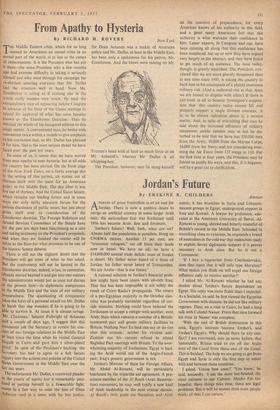From Apathy to Hysteria
By RICHARD H. ROVERE New York
THE Middle Eastern crisis, which for so long seemed to Americans an unreal crisis in an unreal part of the world, is at last at the centre of consciousness. It is the President who has put it there—the same President who a few months ago had extreme difficulty in taking it seriously himself and who went through his campaign for re-election assuring everyone that Mr. Dulles had the situation well in hand. Now Mr. Eisenhower is acting as if nothing else in the world really matters very much. He took the extraordinary step of appearing before Congress in advance of his State of the Union message to appeal for 'approval of what has since become known as 'the Eisenhower Doctrine: Then he devoted the whole of his inaugural address to this single flatter. A conventional man, he broke with convention twice within a month to give emphasis to his conviction that, as Mr. Dulles has phrased it for him, 'this is the most serious threat we have faced over the past ten years.
To some of us, it seems that we have moved from near-apathy to near-hysteria, but at all odds the country has been alerted. On the front page of the New York Times, on a fairly average day ui the setting of this period, six stories out of thirteen dealt with the quest for an American policy in the Middle East. The day after it was five out of thirteen. And the United States Senate, which remains our leading forum and in some ways our only really adequate forum for the serious discussion of public issues, has just about given itself over to consideration of the Eisenhower doctrine. The Foreign Relations and Armed Services Committees of the Senate have for the past ten days been functioning as a unit and taking testimony on the President's proposals, and when they are finished the matter will be taken to the floor for what promises to be one of the historic Senate debates.
There is still not the slightest doubt that the President will get most of what he has asked. But the controversy will not be limited to the Eisenhower doctrine; indeed, it has, in committee, already moved beyond it and got into two matters the administration would just as soon not discuss at the present time—its diplomatic competence In the Middle East and the state of our military preparedness. The questioning of competence takes the form of a personal attack on Mr. Dulles so harsh that one wonders if he is going to be able to survive it. At times it is almost savage. 'Mr. Chairman,' Senator Fulbright of Arkansas said a couple of days ago, 'I suggest that this committee ask the Secretary to review his con- duct of our foreign relations in the Middle East at least since the time when he visited General Neguib in Cairo and gave him a silver-plated pistol.' In spite of the President's backing, the Secretary has had to agree to a full Senate Inquiry into the actions and policies of the United States Government in the Middle East over the last ten years.
The unfortunate Mr. Dulles, a renowned pleader In the courts of equity but a remarkably poor hand at putting himself in a favourable light, seems in a fair way to meet the fate of Dean Acheson---and in a sense with far less justice, for Dean Acheson was a maker of American policy and Mr. Dulles. at least in the Middle East, has been only a spokesman for his patron, Mr. Eisenhower. And the blows were raining on Mr.
Truman's head with at least as much force as on Mr. Achesoill's, whereas Mr. Dulles is all whipping-boy.
The President, however, may be stung himself on the question of preparedness, for every American knows of his authority in this field, and a great many Americans feel that this authority is what warrants their confidence in him. Lesser experts, in Congress and out, have been insisting all along that this confidence has been misplaced, but up to now they have argued very largely in the abstract, and they have failed to get much of an audience. The issue today, though, is greatly simplified. The President, con- vinced that we are more gravely threatened than at any time since 1947, is asking the country to back him in his assumption °fa plainly enormous military risk. (And a unilateral risk at that, since we are bound to dispose with allies.) If there is any truth at all in Senator Symington's supposi- tion that 'this country today cannot lift and properly support a single division overseas, it is, to be almost ridiculous about it, a serious matter. And, in spite of everything that may be said about the increased efficiency of military manpower, public opinion may at last be dis- turbed to be told that we have lost 350.000 men from the Army, 40,000 from the Marine Corps, 16,000 from the Navy, and are considering trim- ming the Air Force from 137 wings to 110. For the first time in four years, the President may be forced to justify his ways, and this, if it happens, will be a great aid to clarification.


































 Previous page
Previous page